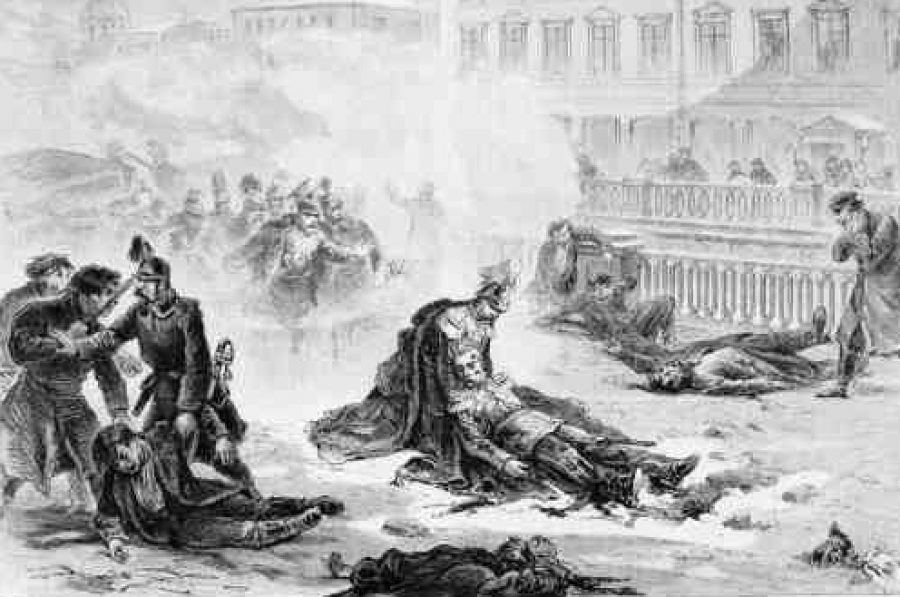
Fairground swings (качели) in St. Petersburg, from an engraving by D. Chodowiecki, 1794.
Breaking News: Yiddish Theatre Makes Money
Barbara Henry, Alyssa Quint
Reviews of Avrom Goldfaden’s productions in the Russian empire from 1878 until 1883 are notorious for critics’ snarky pot-shots, huffy asides, and sniffy evaluations. Goldfaden was accused of offering plays that presented Jews as “unreconstructed zealots” in “sideshow comedies” whose plots were predicated on “banality and deceit” and were insufficiently “elevating” in their effects on ordinary Jewish theatre-goers. 1 You can all but hear the plaintive cries of educated, assimilated Russian-Jewish critics: “Why can’t Goldfaden depict Jews on the Russian stage with dignity and gravitas? Why does he give us Shmendrik when we need Uriel Acosta?”
The sour reviews of the work of the first professional Yiddish playwright and impresario by his contemporaries elicited the suspicion of historians like Nokhem Oyslender (1893-1962) and Uri Finkel (1896-1957), for whom the very fact of Goldfaden’s achievement should have gone some way to tempering overly harsh evaluations of it. How could Goldfaden’s contemporaries have failed to appreciate the enormous difficulties facing him – not only artistic and economic, but political as well? Maybe reviewers’ distaste for Goldfaden was just a question of anti-semitism? Were educated critics prejudiced against the Jewish masses who were Goldfaden’s most passionate fans? Or were there other interests at work, both in the reviews by Goldfaden’s contemporaries, and in twentieth-century Yiddish theatre historians’ reactions to them?

Fairground swings (качели) in St. Petersburg, from an engraving by D. Chodowiecki, 1794.
Consider this curmudgeonly discussion of Goldfaden’s Der ondenk fun plevne (The Memory of Plevna), a musical that showcases not the siege of Russian and Ottoman forces in the Russo-Turkish War of 1877-78, but the experience of army contractors and war profiteers drawn by the financial opportunities that the war offered. Goldfaden’s play focuses on the legions of impoverished Jewish merchants who traveled to Romania to provision the Russian army – often for a tidy profit. The reviewer for the Odessa Novorossiiskii Telegraf was not impressed with the production. Neither, it seems, was the audience:
On the 30th of January, the Jewish theatre’s audience was entirely justified in catcalling and whistling at Goldfaden’s new play, The Memory of Plevna, a mindless assortment of disconnected scenes that would have been much better performed by fairground clowns beneath a giant swing-set.
As a Jew, I must with complete impartiality express the view that many Jews were incensed not only by the production of such coarse drivel that went by the name of “comedy,” but by Goldfaden’s methods for luring the public to such a carnival show. Initially, rumors had spread that the comedy would depict the crafty wheeling-and-dealing of government contractors, agents, and other traders during the war. But then, not wishing to make things unpleasant for local government contractors, the play was crudely redone. In order to rouse a particularly misleading interest in this comedy, all the ticket prices for box seats and others were raised significantly, so that the tickets were completely sold out and box-office takings were maximized.
Meanwhile, the entirely senseless action of the play consists of a poor Polish Jew’s grabbing his shovel and bag and going off to war, in order to make some money. Even more infuriating was Mr. Goldfaden’s deciding, for the sake of profit, not to stage a play that illustrated the lives of Jews, but to show the ordinary Jewish masses a café-chantant with half-naked women and sideshow comedy.
It would not be good to forget that he has been permitted to perform Jewish plays that elevate ordinary Jews, not corrupt their morality. When Goldfaden stages plays from Jewish life, Jews happily attend the theatre and [educated, assimilated] Russian Jews support him in order to exert a beneficial influence in improving the lives of the simple Jewish population. But doing “business,” staging comedies like this for the sake of big box-office, whose object is to lure audiences in and jack up the prices – this is disgraceful. It’s also noteworthy that in Goldfaden’s current troupe, there are none of the former good actors; only [Leyzer] Zukerman, [Moyshe] Finkel, and Miss Schwartz are left, and they’re very bad actors. Yet another result of these money-making schemes: Goldfaden’s brother took the best actors to another city in order to make some money, and left the remnants of a not-particularly-good troupe behind in Odessa. Is the Jewish public really going to support Goldfaden’s business schemes? We think not. This will force Goldfaden to approach the goal of elevating the Jewish masses honorably, by presenting useful plays on the Jewish stage, and not harmful sideshow comedies.
That Goldfaden’s show was in bad taste is likely, but scarcely three lines are actually devoted to discussion of the play’s deficiencies; far more energy is expended on outrage at Goldfaden’s efforts to turn a profit with his work, just like the contractors that he depicts! The reviewer’s fixation on this shocking conjunction of theatre and business and Goldfaden’s “jacking up prices” does make you wonder if an anti-Jewish stereotype is at work in their characterization of the playwright.
Although the privately-owned Novorossiiskii Telegraf had a reputation for anti-semitic bias, the newspaper actually employed a number of outspoken, liberal Jewish journalists. One, Abram Kaufman, was on the editorial board of the pre-eminent liberal journal Russkii Evrei itself. Russkii Evrei’s difficulty with Goldfaden’s populism was based in part on their assumption, common to the Russian-speaking intelligentsia, that “Everyone knows what a tremendous, civilizing influence the theatre has on the common people’s morality, what an important role the theatre has played in the history of the culture of European peoples.” 2 Plays like Shmendrik and Der ondenk fun plevne were letting the side down; in these Goldfaden failed to educate and elevate, to bring Jewish audiences into the fold of European culture. The Russian intelligentsia, historically dominated by nobles with radical sympathies, had no doubt that capitalism was the sworn enemy of art. Goldfaden’s compromises for the sake of profit – like sending seasoned actors on profitable tours while he trained their replacements in Odessa – was proof for them of the poisonous effect of his commercial strategies on his art. The challenges of running a business interested them little, and have never interested critics very much at all.

St. Petersburg’s Aleksandrinsky Theatre, established and funded by the tsars, who, by the way, never lifted a finger or gave a dime to help Goldfaden.
Goldfaden was a canny entrepreneur in a country that was, in the late nineteenth century, only beginning to develop industry and a modern middle class. In its pragmatism, however, Goldfaden’s theatre was one of a number of pioneering private commercial theatres that emerged in provincial Russia in this period. Like every other private theatre, Goldfaden enjoyed no imperial subsidies, no state-maintained facilities, no protection from the caprices of local and imperial censors, and no guarantee of access to the best plays. So he wrote his own. Sometimes they were Der ondenk fun plevne.
Soviet historians of the Yiddish theatre like Oyslender and Finkel were in no position to express any admiration for Goldfaden’s canny capitalism. Their directive was to present Yiddish theatre in imperial Russia as the stunted precursor to the vibrant, class-conscious Soviet Yiddish theatre. In order to salvage Goldfaden’s legacy for the Soviet Yiddish stage, his “persecution” by the tsarist-era press had to be presented as resulting not from his commercial tendencies, but from his mass audiences’ passionate engagement with his plays; not from his interest in flattering the local bourgeoisie, but from the sheer difficulty of upholding the lofty aim of “elevating” the Jewish masses.

Assassination of Alexander II in St. Petersburg, March 13, 1881.
One measure of Goldfaden’s success as an entrepreneur is testified to by his elbowing his way onto the top of the theatrical scene, performing in Moscow in 1880 and St. Petersburg in 1881. But by the time that the imperial monopoly in the two capitals was abolished by Alexander III on March 24, 1882, and the way was open to the rapid expansion of private theatres throughout the empire, it came a little too late for Goldfaden. In 1883, the Russian government, anxious to suppress the pogroms and disorder that had been unleashed by the assassination of Alexander II in 1881, casually banned the Yiddish theatre in a secret government circular. The ban’s erratic—but sufficiently severe enforcement—for the next twenty-odd years effectively quashed Russia’s free-market Yiddish theatre movement in its infancy. Now that’s something to complain about.

